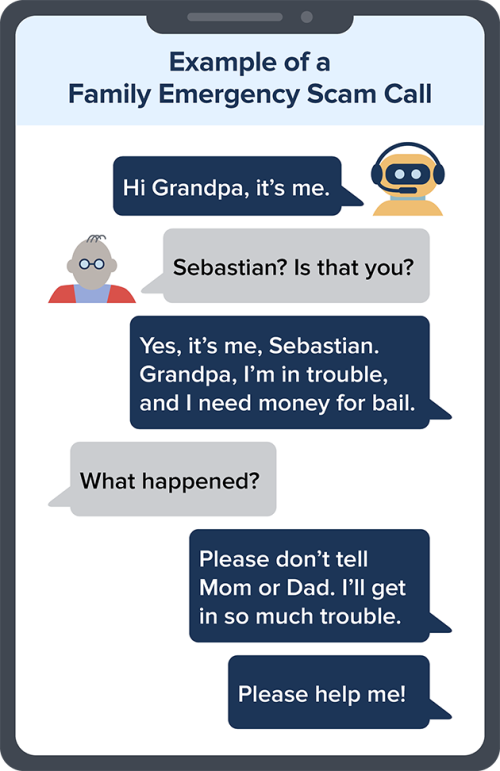
Growing Threat of Voice Cloning Scams: How to Protect Yourself
May 23, 2024
 By Destini Hoffman
By Destini Hoffman•
Branch Manager
Did you receive an urgent phone call from someone who sounds like a friend or family member? Did they ask you for money or personal information? If so, think twice before acting. It just might be a scammer on the other side of the line.The FTC is warning about an uptick in voice cloning scams, where criminals use Artificial Intelligence (A.I.) software to replicate a loved one's voice and scam you out of your money.
What can a scammer do with your voice?
Criminals will scour the web to gather real people's voices from recordings, YouTube videos, social media clips and anything else they can find. Once they have a small audio sample, they can use a "text-to-speech" voice generation software like ElevenLabs, which is available to anyone willing to pay a small subscription fee.
They might try to trick you into believing there was an emergency that requires an urgent transfer of funds. Scammers may also try to impersonate your boss and ask you to wire money for a rush project, or claim to be a kidnapper demanding you pay a ransom. Don't believe it.
Example of a voice cloning scam:

Source: Federal Trade Commission
How to spot and avoid an A.I. voice cloning scam
So how can you tell if it's really a family member, or a scammer using a cloned voice? Remember these tips:
1) Don't panic.
Scammers prey on your emotions. If you think a loved one is in danger, you’re more likely to act quickly without questioning the validity of the situation. Before you act, take a step back and think about the request that is being made. Contact the loved one personally before acting to verify the situation.
2) Trust your instincts.
If you receive such a call from but something feels off, there’s a good chance that it could be a scam. Rely on your intuition in these situations. If something doesn’t feel or sound right, a little bit of investigation can save you money and heartache.
3) Know how to spot red flags.
There are many warning signs that can help you determine if such a phone call is a scam. Some red flags to watch for include:
- The call comes from an unknown number.
- You only briefly hear the person you know before the phone is passed off to someone else.
- You are asked to send money immediately for any reason, especially if it’s through cryptocurrency, gift cards or an online payment platform.
- You are asked for personal or financial account information.
4) Call the person that supposedly is contacting you.
If you receive this type of phone call, there is one person you can rely on to verify its legitimacy — the actual person who supposedly contacted you. Call or text that person using the contact information you have saved for them. You’ll find out quickly whether it was a scam.
5) Be proactive.
Stay ahead of the fraudsters by choosing a "safe word" that only your family knows, which you can use to verify their identity over the phone.
6) Report it.
If you receive a suspicious phone call from someone impersonating someone you know, report it to the Federal Trade Commission immediately at reportfraud.ftc.gov or by calling 1-877-382-4357. You should let friends and family know you received the call, so they can be on alert for suspicious calls as well.
Was this article helpful?
We want to provide solutions that matter, when you need them most. Get the latest fraud and security updates by subscribing to our free newsletter. And if you have any further questions, contact us today.